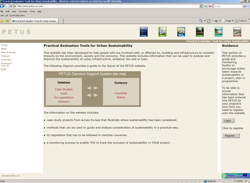Finding the right tools for the urban sustainability job
Decision makers need access to a wide range of tools if urban areas are to be properly managed. They can provide valuable information and guidance about water, sewerage, waste, transport and energy, which are all crucial to the built environment. The PETUS project was set up to create a database of tools and case studies that could be used to bring about sustainability in urban areas. Both the public and private sector benefited from the work, which helped them to manage projects in a better way. The funding was provided in part by the EU through its Energy, Environment and Sustainable Development Programme. Project partner, the Welsh School of Architecture, Cardiff, carried out a literature review of tools and benchmarking data used for assessing sustainability in cities. The researchers identified different theoretical and practical tools, including those used for assessing environmental, social and economic impacts and those which dealt with specific sectors. An important issue highlighted through the review was the limited availability of benchmarking data, which is used to determine an organisation's or government's performance. A further problem was that the available data was found to vary widely between different sectors and was often difficult to calculate and implement. According to the review, available tools were not being used despite the interest shown by those individuals and organisations that would normally put them into practice. This finding highlighted a gap between what should happen in theory and what actually happens in practice. A positive feature arising from the review was the use of tools to improve links between decision makers and the general public. The study carried out by the Welsh School of Architecture can be a major benefit to those responsible for developing and maintaining the infrastructure of Europe's cities. The tools and benchmarking data identified can enable these decision makers to make better and more informed choices when managing sustainability in modern urban environments.





